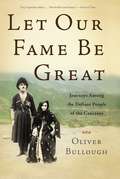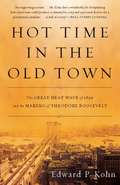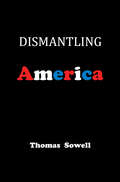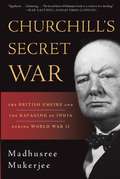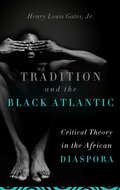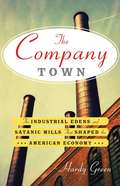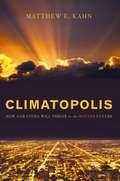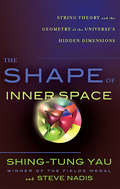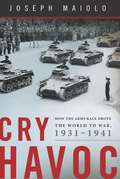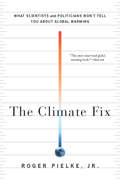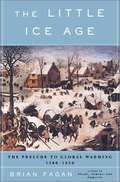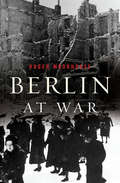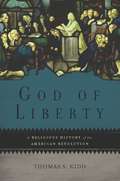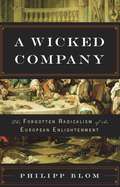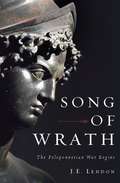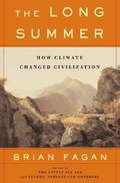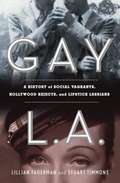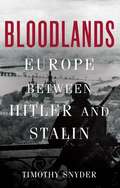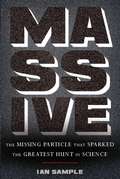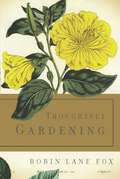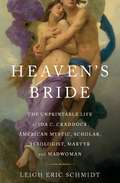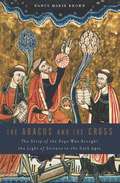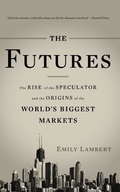- Table View
- List View
Let Our Fame Be Great: Journeys Among the Defiant People of the Caucasus
by Oliver BulloughThe jagged peaks of the Caucasus Mountains have hosted a rich history of diverse nations, valuable trade, and incessant warfare. But today the region is best known for atrocities in Chechnya and the 2008 war between Russia and Georgia. In Let Our Fame Be Great, journalist and Russian expert Oliver Bullough explores the fascinating cultural crossroads of the Caucasus, where Europe, Asia, and the Middle East intersect. Traveling through its history, Bullough tracks down the nations dispersed by the region’s last two hundred years of brutal warfare. Filled with a compelling mix of archival research and oral history, Let Our Fame Be Great recounts the tenacious survival of peoples who have been relentlessly invaded and persecuted and yet woefully overlooked.
Hot Time in the Old Town: The Great Heat Wave of 1896 and the Making of Theodore Roosevelt
by Edward P. KohnOne of the worst natural disasters in American history, the 1896 New York heat wave killed almost 1,500 people in ten oppressively hot days. The heat coincided with a pitched presidential contest between William McKinley and the upstart Democrat William Jennings Bryan, who arrived in New York City at the height of the catastrophe. As historian Edward P. Kohn shows, Bryan’s hopes for the presidency began to flag amidst the abhorrent heat just as a bright young police commissioner named Theodore Roosevelt was scrambling to mitigate the dangerously high temperatures by hosing down streets and handing out ice to the poor. A vivid narrative that captures the birth of the progressive era, Hot Time in the Old Town revives the forgotten disaster that almost destroyed a great American city.
Dismantling America: and other controversial essays
by Thomas SowellThese wide-ranging essays--on many individual political, economic, cultural and legal issues--have as a recurring, underlying theme the decline of the values and institutions that have sustained and advanced American society for more than two centuries. This decline has been more than an erosion. It has, in many cases, been a deliberate dismantling of American values and institutions by people convinced that their superior wisdom and virtue must over-ride both the traditions of the country and the will of the people. Whether these essays (originally published as syndicated newspaper columns) are individually about financial bailouts, illegal immigrants, gay marriage, national security, or the Duke University rape case, the underlying concern is about what these very different kinds of things say about the general direction of American society. This larger and longer-lasting question is whether the particular issues discussed reflect a degeneration or dismantling of the America that we once knew and expected to pass on to our children and grandchildren. There are people determined that this country's values, history, laws, traditions and role in the world are fundamentally wrong and must be changed. Such people will not stop dismantling America unless they get stopped--and the next election may be the last time to stop them, before they take the country beyond the point of no return.
Churchill's Secret War: The British Empire and the Ravaging of India during World War II
by Madhusree MukerjeeA dogged enemy of Hitler, resolute ally of the Americans, and inspiring leader through World War II, Winston Churchill is venerated as one of the truly great statesmen of the last century. But while he has been widely extolled for his achievements, parts of Churchill's record have gone woefully unexamined. As journalist Madhusree Mukerjee reveals, at the same time that Churchill brilliantly opposed the barbarism of the Nazis, he governed India with a fierce resolve to crush its freedom movement and a profound contempt for native lives. A series of Churchill's decisions between 1940 and 1944 directly and inevitably led to the deaths of some three million Indians. The streets of eastern Indian cities were lined with corpses, yet instead of sending emergency food shipments Churchill used the wheat and ships at his disposal to build stockpiles for feeding postwar Britain and Europe.Combining meticulous research with a vivid narrative, and riveting accounts of personality and policy clashes within and without the British War Cabinet, Churchill's Secret War places this oft-overlooked tragedy into the larger context of World War II, India's fight for freedom, and Churchill's enduring legacy. Winston Churchill may have found victory in Europe, but, as this groundbreaking historical investigation reveals, his mismanagement--facilitated by dubious advice from scientist and eugenicist Lord Cherwell--devastated India and set the stage for the massive bloodletting that accompanied independence.
Tradition and the Black Atlantic: Critical Theory in the African Diaspora
by Henry Louis Gates Jr.Renowned scholar Gates (W. E. B. Du Bois Institute for African and African American Research, Harvard U. ) revises and expands lectures in which he examines the Black Arts Movement of the 1980s in Britain and the American culture wars in the 1990s. Here, he attempts to understand these cultural movements, their key themes and trends, and the effects on culture in Britain and the US. He begins with Edmund Burke's views of colonialism in the eighteenth century; critiques the concept of cultural studies and discusses its uses in the US and Britain by black cultural critics; addresses the work of theorist Frantz Fanon in the areas of culture, race, and nation in the Black Arts Movement; and considers the state of the American culture wars. Annotation ©2011 Book News, Inc. , Portland, OR (booknews. com)
The Company Town: The Industrial Eden's and Satanic Mills That Shaped the American Economy
by Hardy GreenThis is a historical survey of the American experience with the company town. Green (a former editor at BusinessWeek) offers accounts of the origins and development of different company towns, distinguishing between "Exploitationvilles" in which companies sought to extract as much profit as possible from their workers, at one end of the spectrum, and more benign, even utopian, experiments that provided paternalistic support for workers' needs at the other. He describes the impact of these company towns on the nature of American capitalism, the range of living and working conditions experienced by workers in the towns, the labor disputes that frequently arose, and modern incarnations of the company town in the era of the information revolution. Annotation ©2011 Book News, Inc. , Portland, OR (booknews. com)
Climatopolis: How Our Cities Will Thrive in the Hotter Future
by Matthew E. KahnWe have released the genie from the bottle: climate change is coming, and there’s no stopping it. The question, according to Matthew Kahn, is not how we’re going to avoid a hotter future but how we’re going to adapt to it. In Climatopolis, Kahn, one of the world’s foremost experts on the economics of the environment, argues that cities and regions will adapt to rising temperatures over time, slowly transforming our everyday lives as we change our behaviors and our surroundings. Taking the reader on a tour of the world’s cities-- from New York to Beijing to Mumbai--Kahn’s clear-eyed, engaging, and optimistic message presents a positive yet realistic picture of what our urban future will look like.
The Shape of Inner Space: String Theory and the Geometry of the Universe's Hidden Dimensions
by Shing-Tung Yau Steve NadisString theory says we live in a ten-dimensional universe, but that only four are accessible to our everyday senses. According to theorists, the missing six are curled up in bizarre structures known as Calabi-Yau manifolds. In The Shape of Inner Space, Shing-Tung Yau, the man who mathematically proved that these manifolds exist, argues that not only is geometry fundamental to string theory, it is also fundamental to the very nature of our universe.Time and again, where Yau has gone, physics has followed. Now for the first time, readers will follow Yau's penetrating thinking on where we've been, and where mathematics will take us next. A fascinating exploration of a world we are only just beginning to grasp, The Shape of Inner Space will change the way we consider the universe on both its grandest and smallest scales.
Cry Havoc: How the Arms Race Drove the World to War, 1931-1941
by Joe MaioloDid the arms race of the 1930s cause the Second World War? In Cry Havoc, historian Joseph Maiolo shows, in rich and fascinating detail, how the deadly game of the arms race was played out in the decade prior to the outbreak of the Second World War. In this exhaustively researched account, he explores how nations reacted to the moves of their rivals, revealing the thinking of those making the key decisions--Hitler, Mussolini, Chamberlain, Stalin, Roosevelt--and the dilemmas of democratic leaders who seemed to be faced with a choice between defending their nations and preserving their democratic way of life. An unparalleled account of an era of extreme political tension, Cry Havoc shows how the interwar arms race shaped the outcome of World War II before the shooting even began.
The Climate Fix: What Scientists and Politicians Won't Tell You About Global Warming
by Roger Pielke Jr.Why has the world been unable to address global warming? Science policy expert Roger Pielke, Jr., says it's not the fault of those who reject the Kyoto Protocol, but those who support it, and the magical thinking that the agreement represents. In The Climate Fix, Pielke offers a way to repair climate policy, shifting the debate away from meaningless targets and toward a revolution in how the world's economy is powered, while de-fanging the venomous politics surrounding the crisis. The debate on global warming has lost none of its power to polarize and provoke in a haze of partisan vitriol. The Climate Fix will bring something new to the discussions: a commonsense perspective and practical actions better than any offered so far.
The Little Ice Age
by Brian M. FaganThe Little Ice Age, the most significant climate event of the last millennium, was sandwiched between two warm spells-- the Medieval Warm Period, which lasted from about 900 to 1300 AD, and the present global warming, which began in about 1850. Although climatologists long suspected the broad outlines of these periods, only within the past decade have they developed an accurate picture of climate conditions in historical times. They can now determine yearly average temperatures and rainfall, the times and magnitude of volcanic eruptions, and even how brightly the sun shone centuries ago. This book focuses on the weather, farming and the fishing and exploring of the north Atlantic.
Berlin at War: Life And Death In Hitler's Capital, 1939-1945
by Roger MoorhouseBerlin was the city at the very center of World War Two. It was the launching pad for Hitler’s empire, the embodiment of his vision of a "world metropolis. ” Berlin was also the place where Hitler’s Reich would ultimately fall. Berlin suffered more air raids than any other German city and endured the full force of a Soviet siege. In Berlin at War, historian Roger Moorhouse uses diaries, memoirs, and interviews to provide a searing first-hand account of life and death in the Nazi capital--the privations, the hopes and fears, and the nonconformist tradition that saw some Berliners provide underground succour to the city’s remaining Jews. Combining comprehensive research with gripping narrative, Berlin at War is the incredible story of the city--and people--that saw the whole of World War Two.
God of Liberty: A Religious History of the American Revolution
by Thomas S. KiddBefore the Revolutionary War, America was a nation divided by different faiths. But when the war for independence sparked in 1776, colonists united under the banner of religious freedom. Evangelical frontiersmen and Deist intellectuals set aside their differences to defend a belief they shared, the right to worship freely. Inspiring an unlikely but powerful alliance, it was the idea of religious liberty that brought the colonists together in the battle against British tyranny. In God of Liberty, historian Thomas S. Kidd argues that the improbable partnership of evangelicals and Deists saw America through the Revolutionary War, the ratification of the Constitution, and the election of Thomas Jefferson in 1800. A thought-provoking reminder of the crucial role religion played in the Revolutionary era, God of Liberty represents both a timely appeal for spiritual diversity and a groundbreaking excavation of how faith powered the American Revolution.
A Wicked Company: The Forgotten Radicalism of the European Enlightenment
by Philipp BlomThe acclaimed author of The Vertigo Years tells the remarkable story of the Parisian salon that hosted the eighteenth century's greatest minds and changed the course of Western philosophy
Song of Wrath: The Peloponnesian War Begins
by J. E. LendonSong of Wrath tells the story of Classical Athens’ victorious Ten Years’ War (431- 421 BC) against grim Sparta--the first decade of the terrible Peloponnesian War that turned the Golden Age of Greece to lead. Historian J. E. Lendon presents a sweeping tale of pitched battles by land and sea, sieges, sacks, raids, and deeds of cruelty and guile--along with courageous acts of mercy, surprising charity, austere restraint, and arrogant resistance. Recounting the rise of democratic Athens to great-power status, and the resulting fury of authoritarian Sparta, Greece’s traditional leader, Lendon portrays the causes and strategy of the war as a duel over national honor, a series of acts of revenge. A story of new pride challenging old, Song of Wrath is the first work of Ancient Greek history for the post-cold-war generation.
The Long Summer
by Brian M. FaganThe Long Summer illuminates the centuries-long pattern of human adaptation to the demands and challenges of an ever-changing climate-challenges that are still with us today.
Gay L. A.: A History of Sexual Outlaws, Power Politics, and Lipstick Lesbians
by Lillian Faderman Stuart TimmonsThe exhortation to "Go West!" has long captured the American imagination. But for the gays, lesbians, and transgendered people who have moved to L.A. over the past two centuries, the City of Angels has offered a special home--which in turn gave rise to one of the most influential gay cultures in the world. Drawing upon untouched archival materials and over three hundred new interviews, Lillian Faderman and Stuart Timmons chart L.A.'s unique gay history, from the first missionary encounters with Native American cross-gendered "two spirits" to cross-dressing frontier women in search of their fortunes; from the same-sex salons of early Hollywood powers such as Alla Nazimova and George Cukor to the explosion of gay life during World War II. They show how underground organizing began locally in the 1950s and spread nationally as well as how L.A.'s radical gay liberation movement of the sixties and seventies evolved into today's power politics. Unparalleled financial resources nurtured an institutionalized lesbian and gay culture that has interwoven with the fabric of national culture. Faderman and Timmons show how geography, economic opportunity, and a constant influx of new people created a city that fostered more lasting gay institutions than any other in America. Combining broad historical scope with deftly wrought stories of real people, from the Hollywood sound stage to the Barrio, Gay L.A. is American social history at its best. LILLIAN FADERMAN is the award-winning author of numerous books on lesbian/gay history, including Surpassing the Love of Men and Odd Girls and Twilight Lovers, which were both named among The New York Times notable books of the year. Her most recent book, Naked in the Promised Land, received the Judy Grahn Award for nonfiction.
Bloodlands: Europe Between Hitler and Stalin
by Timothy SnyderAmericans call the Second World War "The Good War. " But before it even began, America's wartime ally Josef Stalin had killed millions of his own citizens-and kept killing them during and after the war. Before Hitler was finally defeated, he had murdered six million Jews and nearly as many other Europeans. At war's end, both the German and the Soviet killing sites fell behind the iron curtain, leaving the history of mass killing in darkness. Bloodlandsis a new kind of European history, presenting the mass murders committed by the Nazi and Stalinist regimes as two aspects of a single history, in the time and place where they occurred: between Germany and Russia, when Hitler and Stalin both held power. Assiduously researched, deeply humane, and utterly definitive,Bloodlandswill be required reading for anyone seeking to understand the central tragedy of modern history.
Bloodlands: Europe between Hitler and Stalin
by Timothy SnyderA prize-winning historian recasts the history of modern Europe around its central catastrophe: the fourteen million people killed by totalitarian regimes in the lands between Hitler and Stalin
Massive
by Ian SampleThe biggest science story of our time, Massive spans four decades, weaving together the personal narratives and international rivalries behind the search for the "God" particle, or Higgs boson. A story of grand ambition, intense competition, clashing egos, and occasionally spectacular failures, Massive is the first book that reveals the science, culture, and politics behind the biggest unanswered question in modern physics-what gives things mass? Drawing upon his unprecedented access to Peter Higgs, after whom the particle is named, award-winning science writer Ian Sample chronicles the multinational and multibillion-dollar quest to solve the mystery of mass. For scientists, to find the God particle is to finally understand the origin of mass, and until now, the story of their search has never been told.
Massive
by Ian SampleA prize-winning science writerOCOs history of the forty-year search for the Higgs boson, and the intense rivalries, clashing egos, and grand ambition that led to a world-changing discovery
Thoughtful Gardening
by Robin Lane FoxIn Thoughtful Gardening, award-winning historian and Financial Times gardening columnist Robin Lane Fox takes readers on a delightful journey through each season of the gardening year. From fending off vine-weevils to visiting Yves Saint Laurent’s private gardens in Marrakech, Fox imbues each of his musings with grace, sophistication, and charm. Essential reading for anyone planting a new garden or taking stock of one after several years, Thoughtful Gardening offers expert advice and a touching reminder of the power of art and literature to deepen what we see and experience in nature. Combining a vast understanding of horticulture with witty and stylish storytelling, these vignettes form--season by season--a rich reflection on the lessons, challenges, and joys of life with a green thumb.
Heaven's Bride: The Unprintable Life of Ida C. Craddock, American Mystic, Scholar, Sexologist, Martyr, and Madwoman
by Leigh Eric SchmidtThe nineteenth-century eccentric Ida C. Craddock was by turns a secular freethinker, a religious visionary, a civil-liberties advocate, and a resolute defender of belly-dancing. Arrested and tried repeatedly on obscenity charges, she was deemed a danger to public morality for her candor about sexuality. By the end of her life Craddock, the nemesis of the notorious vice crusader Anthony Comstock, had become a favorite of free-speech defenders and women's rights activists. She soon became as well the case-history darling of one of America's earliest and most determined Freudians.In Heaven's Bride, prize-winning historian Leigh Eric Schmidt offers a rich biography of this forgotten mystic, who occupied the seemingly incongruous roles of yoga priestess, suppressed sexologist, and suspected madwoman. In Schmidt's evocative telling, Craddock's story reveals the beginning of the end of Christian America, a harbinger of spiritual variety and sexual revolution.
The Abacus and the Cross: The Story of the Pope Who Brought the Light of Science to the Dark Ages
by Nancy Marie BrownThe medieval Catholic Church, widely considered a source of intolerance and inquisitorial fervor, was not anti-science during the Dark Ages--in fact, the pope in the year 1000 was the leading mathematician and astronomer of his day. Called "The Scientist Pope,” Gerbert of Aurillac rose from peasant beginnings to lead the church. By turns a teacher, traitor, kingmaker, and visionary, Gerbert is the first Christian known to teach math using the nine Arabic numerals and zero. In The Abacus and the Cross, Nancy Marie Brown skillfully explores the new learning Gerbert brought to Europe. A fascinating narrative of one remarkable math teacher, The Abacus and the Cross will captivate readers of history, science, and religion alike.
The Futures: The Rise of the Speculator and the Origins of the World's Biggest Markets
by Emily LambertIn The Futures, Emily Lambert, senior writer at Forbes magazine, tells us the rich and dramatic history of the Chicago Mercantile Exchange and Chicago Board of Trade, which together comprised the original, most bustling futures market in the world. She details the emergence of the futures business as a kind of meeting place for gamblers and farmers and its subsequent transformation into a sophisticated electronic market where contracts are traded at lightning-fast speeds. Lambert also details the disastrous effects of Wall Street's adoption of the futures contract without the rules and close-knit social bonds that had made trading it in Chicago work so well. Ultimately Lambert argues that the futures markets are the real "free" markets and that speculators, far from being mere parasites, can serve a vital economic and social function given the right architecture. The traditional futures market, she explains, because of its written and cultural limits, can serve as a useful example for how markets ought to work and become a tonic for our current financial ills.
